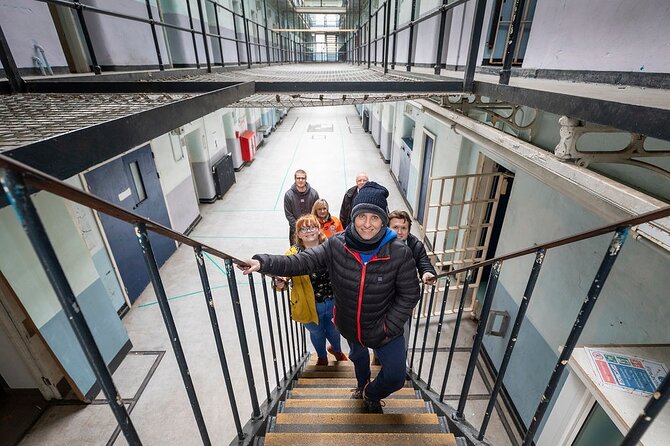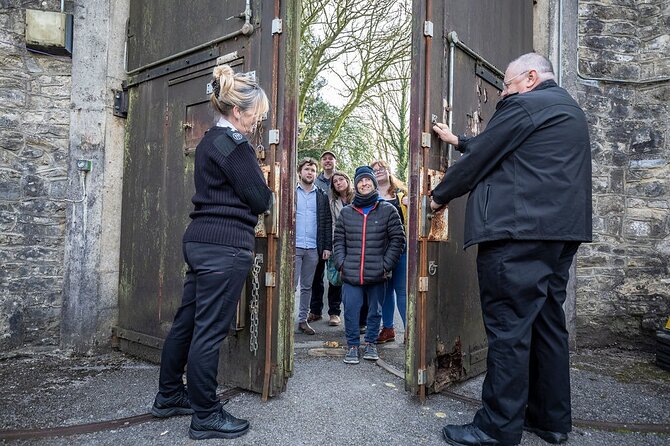Shepton Mallet Prison, England’s oldest operational prison built in 1625, offers a self-guided tour to explore its captivating history. Visitors can examine the austere cells, witness the execution areas, and imagine the daily routines within the exercise yards and infirmary. The self-guided nature provides flexibility to explore the site at one’s own pace, with pre-booked tickets ensuring a seamless experience. While not wheelchair-accessible, the prison is stroller-friendly and allows service animals, making it an accessible destination. Delve deeper into the prison’s evolution and the stories of its earliest inmates through the available exhibits and artifacts.
Key Points

- Oldest operational prison in England, constructed in 1625, offering a self-guided tour of cells, execution areas, and other significant locations.
- Pre-booked tickets ensure a seamless visit with a range of start times, providing flexibility to explore the prison at one’s own pace.
- While not wheelchair-accessible, the tour is stroller-friendly and allows service animals, making it accessible to a wide range of visitors.
- The self-guided tour provides a captivating glimpse into Britain’s criminal justice history, with accounts of the prison’s earliest inmates and evolving design.
- The prison’s proximity to public transportation and 5.0 rating with a Badge of Excellence make it a must-visit destination for those interested in criminal justice history.
Overview of Shepton Mallet Prison
Shepton Mallet Prison, the oldest operational prison in England, was constructed in 1625 and offers visitors a unique opportunity to witness British history firsthand.
This self-guided tour allows guests to explore the prison’s cells, execution areas, and other significant locations at their own pace. Visitors can pre-book tickets to ensure a seamless visit, with a range of start times available to accommodate different schedules.
The prison may not be wheelchair accessible, but it’s stroller-friendly and allows service animals. Located near public transportation, Shepton Mallet Prison is a must-visit destination for those interested in learning about the country’s rich criminal justice history.
Loving the local insights? Here are more guided experiences we recommend in South West England
Highlights of the Self-Guided Tour

The self-guided tour of the historic Shepton Mallet Prison offers visitors an immersive glimpse into the prison’s storied past, allowing them to explore its cells, execution areas, and other integral facilities at their own pace. Visitors can examine the chilling remnants of the prison’s past, from the cold, confined cells to the haunting execution chamber where numerous inmates met their fate. The self-guided nature of the tour empowers guests to explore the prison’s history at their preferred rhythm, fostering a deeply personal and thought-provoking experience.
| Feature | Description |
|---|---|
| Cells | Explore the cramped, austere cells where inmates were confined |
| Execution Areas | Witness the somber sites where prisoners were executed |
| Exercise Yards | Imagine the daily routines of inmates within the prison grounds |
| Infirmary | Gain insight into the medical care (or lack thereof) provided to prisoners |
| Chapel | Reflect on the role of religion and spirituality within the prison system |
Visiting Hours and Ticket Information

When can visitors explore the historic Shepton Mallet Prison? Tickets for the self-guided tour must be pre-booked, with a range of start times available throughout the day to accommodate different schedules. Guests can choose from a variety of time slots to embark on their journey through this renowned English correctional facility.
Tour start times are offered at regular intervals, allowing visitors to plan their visit according to their preferences.
Booking tickets in advance guarantees a seamless experience, ensuring guests don’t have to wait in line upon arrival.
The self-guided nature of the tour provides flexibility, enabling visitors to explore the prison at their own pace and focus on the areas that interest them the most.
Accessibility and Amenities

Visitors’ accessibility needs are thoughtfully accommodated at Shepton Mallet Prison, though the historic facility itself isn’t wheelchair-accessible. Strollers can be brought along, and service animals are permitted on the premises.
The prison’s proximity to public transportation makes it easily accessible for those relying on buses or trains. While the tour may pose some physical challenges due to the historic architecture, the staff is committed to ensuring all guests can explore the site’s rich history and features.
Visitors are encouraged to communicate any special requirements in advance to ensure a comfortable and seamless experience. Overall, Shepton Mallet Prison strives to be as accessible as possible, catering to the diverse needs of its guests.
Exploring the Prison’s History

Constructed in 1625, Shepton Mallet Prison stands as the oldest operating prison in England, offering visitors a unique glimpse into the nation’s complex criminal justice history.
As guests explore the facility, they’ll discover:
- Accounts of the prison’s earliest inmates, many of whom were convicted of minor crimes and served harsh sentences in the dank, overcrowded cells.
- The eerie execution chambers where prisoners were hanged, a grim reminder of the severity of punishment in bygone eras.
- Artifacts and exhibits that showcase the evolution of prison design and reform, from the harsh conditions of the 17th century to modern-day efforts at rehabilitation.
Through this immersive experience, visitors gain a deeper appreciation for the weighty role prisons have played in shaping British society.
- Shepton Mallet Prison Escape Room – The Hole
- Full-Day Stonehenge and Avebury Tour From Glastonbury
- Lyme Regis Town Walking Tours
- 2-Day Tour of King Arthurs Cornwall in Tintagel, Boscastle and Dartmoor From Glastonbury
- 6 Best Tours In South West England
- South West Coast Path Walking – Somerset & Devon (11 Days, 10 Nights)
Preparing for Your Visit

To ensure a seamless visit, travelers can pre-book their tickets for Shepton Mallet Prison’s self-guided tour. With a range of start times available, visitors can conveniently plan their exploration of this historic site at their preferred pace.
While the prison isn’t wheelchair accessible, it’s stroller-friendly, and service animals are allowed. Located near public transportation, the prison provides easy access for all.
Visitors should note that the prison is dog-friendly, and they can take advantage of the free cancellation policy up to 24 hours prior to their visit.
With a Badge of Excellence and a 5.0 rating, this tour promises an immersive experience in British history.
Customer Reviews and Ratings
With an impressive 5.0 rating and a Badge of Excellence, the self-guided tour at Shepton Mallet Prison has garnered overwhelmingly positive reviews from visitors.
According to the 270 customer reviews, the tour offers a captivating glimpse into Britain’s history, allowing guests to explore the prison’s cells and execution areas at their own pace.
Visitors have praised the seamless pre-booking process and the range of start times available, making it easy to fit the tour into their schedules. Plus, the prison’s accessibility features, such as being stroller-friendly and welcoming service animals, have been well-received by reviewers.
‘A must-visit for anyone interested in British history!’
‘The self-guided tour was informative and eye-opening.’
‘Highly recommended for a unique and memorable experience.’
Booking and Cancellation Policy

Visitors can easily pre-book tickets for the self-guided tour at Shepton Mallet Prison, ensuring a seamless and efficient visit.
Those who’ve booked their tickets can take advantage of the flexible start times offered, allowing them to plan their tour around their schedule.
Plus, the prison offers free cancellation up to 24 hours prior to the scheduled visit, providing customers with the flexibility to make any necessary changes to their plans.
This booking and cancellation policy allows visitors to approach their tour with confidence, knowing they can adjust their plans if needed without incurring any additional costs.
The prison’s commitment to customer convenience is evident in these flexible booking options.
Frequently Asked Questions
Can I Take Photographs Inside the Prison?
Visitors are generally permitted to take photographs inside the prison, though some areas or exhibits may have restrictions. It’s best to check with staff upon arrival to confirm the photography policy and any limitations for the self-guided tour.
How Long Does the Self-Guided Tour Typically Take?
The self-guided tour typically takes 1 to 2 hours, depending on the visitor’s pace and how much time they spend exploring the various features of the prison. Visitors can expect to spend time wandering through the cells and other areas of the historic site.
Are There Any Restrictions on What I Can Bring?
Visitors are generally allowed to bring small personal items like cameras and water bottles on the tour. However, there may be restrictions on larger bags or items that could pose a security risk. It’s best to check the venue’s policies before the visit.
Is There a Dress Code for the Tour?
There is no formal dress code for the tour. Visitors can wear comfortable, casual clothing suitable for exploring the historic site. As long as the attire is appropriate for the venue, there are no specific requirements.
Can I Purchase Souvenirs or Merchandise On-Site?
Yes, visitors can purchase souvenirs and merchandise on-site during the self-guided tour. The prison gift shop offers a range of items related to the prison’s history and experience.
Recap
Shepton Mallet Prison offers a captivating self-guided tour, allowing visitors to step back in time and explore the oldest prison in England.
From the cells to the execution areas, the tour immerses guests in the rich history of British criminal justice, providing an inclusive and accessible experience.
With convenient public transportation access and rave reviews, this historic site is a must-visit for those seeking to uncover the fascinating legacy of England’s judicial evolution.
